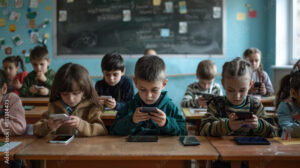Hey there, welcome back to my blog!
Today I want to talk about something that stirred up a lot of interesting conversation in our recent educational technology class: Should cell phones be banned in classrooms?
Now, I know this topic can be a bit divisive. Some say phones are great learning tools, others say they are a complete distraction. But let me walk you through what I think, not just from research, but from my own experience as a former teacher.
My First Reaction: Yes, Ban Them! ![]()
As soon as I read the topic, my gut reaction was:
“Yes! Absolutely ban them!”
Why? Because I have seen what phones can do in a classroom and ofcourse not in a good way.
Back in India, I used to teach science to students from grades 6 to 10. One day I was explaining the digestive system with diagrams on the board, and I noticed a few students smiling at their laps. You guessed it right, they were watching memes on their phones, hiding them under the desk. It was frustrating, honestly. And this wasn’t just once. It kept happening.
That’s when I realized, even if we set rules, phones almost always found a way to distract. 
In our class debate, my partner Meherun and I were on the “Agree” side. We believe phones should be banned in classrooms.
Our lovely classmate Sadi took the “Disagree” side, and let me just say, she did a fantastic job! She brought forward strong points, solid research, and spoke with so much passion. I really appreciated her angle.
But even after hearing the other side, my views didn’t change much. If anything, they became clearer.
What We Discovered on Our Side
We dug into a bunch of studies and examples, and honestly, they made a lot of sense to me as a teacher.
A Carleton University study showed that test scores jumped by 6.4% when phones were banned. That’s the same as adding a whole extra week of learning.
In New York, schools that banned phones early saw fewer behavior issues and more focused classrooms. A statewide ban is coming in 2025.
According to the National Center for Education Statistics, more than half of school leaders say phones are hurting learning, not helping.
In New South Wales, Australia, principals noticed that banning phones led to better peer interactions, improved focus, and fewer disruptions.
All of this added up with my own classroom experience. Teaching without phones felt more peaceful and productive. Students actually made eye contact, raised hands, and stayed present.
There were even a couple of media pieces we used that really stuck with me.
The Stanford GSE podcast featured educators discussing how phone use is linked with rising anxiety and poor attention spans in class.
Last but not the least,
The TEDx Talk by Jonathan Haidt was powerful. He said phones are not just distractions, they’re a public health threat. He talked about the connection between phones and teen depression, loneliness, and sleep problems. That really hit me hard.
When I thought about my own students, some of whom looked exhausted and emotionally checked out, this talk helped me understand why.
Meherun and I tried well to incorporate these findings in our debate and I am sure our friends were well convinced.
Nevertheless, Let’s Talk About the Other Side Too…
Like I said earlier, Sadi had some valid points too.
According to Campbell et al. (2024), blanket bans are not always effective. Sometimes they leave out opportunities to teach students how to use phones responsibly.
In her other agreement she brought in a research where Thomas, O’Bannon & Bolton (2013) pointed out that many teachers actually like using phones for activities like quick polls, research tasks, or making videos. They argued for more balanced policies and not full bans, but smart use with teacher guidance. That sounds great in theory.
But here’s my honest question: 
Do we really have the time and energy to constantly monitor phone use, guide every student, and still manage the rest of the lesson?
In real classrooms especially ones with 30+ kids- that’s tough, really tough!!!
From My Teacher Heart to Yours
I know we live in a tech-heavy world, and yes, students need digital skills. But do they need to be on TikTok during Algebra? Probably not.
I truly believe:
“Phones outside the classroom? Sure. Phones inside the classroom? Big no.”
Let’s create phone-free zones in class where real learning and human connection can happen. Want to teach digital literacy? Great, do that during media periods, not during a Shakespeare lesson.
Some Real Benefits of Banning Phones
Here’s what I noticed when we had phone-free days in school:
- Students were less anxious.
- They talked to each other during breaks.
- They asked more questions in class.
- And believe it or not, they slept better because they weren’t glued to their phones all night.
We don’t have to demonize technology. But we do need to protect focus, attention, and mental health and school is the right place to start.
I have an additional short but powerful news segment to back my part of debate:
“Why Schools Should Ban Phones”
It shows what happened when schools started banning phones. And the results are honestly impressive.
Now I’d love to hear from you
Have you ever been distracted by your phone in class or tried teaching while students were glued to their phones?
Drop your thoughts below!!!!
Thanks for reading
Kritika

Hi Kritika,
I love your passion for the argument about banning cell phones in class. You and Maherun did a great job presenting your side in class this week! I have found similar situations in my classes where students have access to their phones – more off task behaviour, less face to face conversations, more distractions. As an adult, I find it hard to put down my phone and be present in some situations so I can only imagine how much harder it must be for kids!
I think that as educators, we need to do a better job of teaching interpersonal skills alongside digital skills in school. At my school, we discovered that a large group of Grade 5 students had created a Snapchat group and were bullying others in their classroom. This was not happening in the classroom or during school hours so it was handled by the parents and admin, but it sure did affect what happened in the classroom!
I am not convinced that student’s mental health is necessarily better without phones in the classroom. I think that particular issue with the Grade 5s could have been a really powerful teachable moment for the whole class if there had been hands on digital literacy connected to lessons about empathy, integrity and accountability.
Thanks for your great post!
Hi Kritika,
I appreciate your clear and honest perspective on banning cell phones in classrooms. Your experience completely matches with my experience as an English language teacher in Nepal. I have observed how mobile phones can distract students and affect their learning. I faced similar challenges in Nepal, where large class sizes and limited resources make it difficult to manage phone use effectively.
Your points about students feeling tired and stressed due to phone use are very important. Many of my students experience similar difficulties. Phones often reduce their ability to focus, especially when learning a new language that requires concentration and practice.
The studies you referenced, such as the one from Carleton University, align with observations from my teaching context. When phones are restricted, students tend to participate more actively and concentrate better during lessons.
While mobile phones have educational benefits, their unrestricted use in classrooms can be disruptive. I believe establishing phone-free periods during lessons and providing guidance on responsible phone use would benefit schools in Nepal.
Thank you for sharing your thoughtful insights.
Hi,
To be honest, I think that mobile phone should be banned in classroom. I think that this policy can improve classroom focus, increase peer interaction, and there would be fewer disciplinary issues related to social media, and we can create a more focused, respectful learning environment.
Ugh, the endlessly distracting cell phone in the classroom. No thanks!
I found you and Maherun’s debate stance realistic, engaging, and thought-provoking! Supported by years of teaching and the golden age of cellphone use/addiction, I too went into the debate with the staunch stance that they should be banned in the classroom setting. While I heard a lot of educators upset by the idea of not having access to their phones, I was not swayed to feel that they are an integral learning tool. If anything, the adult responses simply reinforced how emotionally attached individuals are with their phones.
Could we regulate them on a classroom to classroom basis? Yes, but how much work would the teachers that choose not to have those distractions in their room be faced with as children have emotionally immature meltdowns and argue endlessly: “Mr. Smith lets us use them…” It is a recipe for disaster.
Yes, they are here to stay and an ever-present component of so many individual’s lives but does that mean we need to encourage using them with such a high cost to our students? Let’s support their mental health as well as their learning and skip the anxiety-inducing, ultimate distraction of the cellphone from the classroom environment!
As a fellow teacher, I deeply relate to your experience and perspective. I’ve also witnessed how phones disrupt learning, no matter how many rules we set. The moment students have unrestricted access, focus shifts from the lesson to social media or games. Your point about energy is spot on—it’s incredibly hard to teach, manage behavior, and monitor phone use all at once in a crowded classroom. I’ve seen firsthand the difference during phone-free periods—more eye contact, deeper discussions, and fewer distractions. Like you, I believe banning phones during class protects not only learning but also students’ emotional well-being.
Hi Kritika,
Thanks for sharing your honest take on such a tricky issue! I really appreciated the way you acknowledged both the frustrations and the possibilities that come with cell phone use in classrooms. I completely agree that cellphones can have pros and cons in the classroom.
In class I mentioned how I used to feel fairly confident managing devices in my classroom, I had clear expectations and consistent consequences, and it worked for the most part. But since the provincial ban came into effect here in Saskatchewan, I’ve actually found it harder. Students haven’t stopped using phones; they’ve just become sneakier, slipping them out in bathrooms or under desks. It’s been a real shift in how I have to manage things.
I completely agree with your point that banning phones doesn’t necessarily teach responsible use. Like you, I think we need to strike a balance- setting boundaries while also teaching digital citizenship and helping students understand the why behind our expectations.
Thanks for sharing!